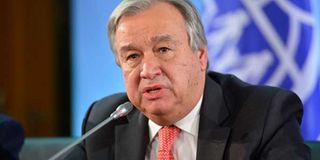UN lauds pact on Africa free trade area

UN secretary-general António Guterres
What you need to know:
“I salute the leadership of President Paul Kagame of Rwanda, President Mahamadou Issoufou of Niger and the Chairperson of the African Union Commission, Mr Moussa Faki, who led the process,” UN secretary-general António Guterres said in a statement released on Thursday.
Dar es Salaam. The United Nations has commended African leaders for signing the African Continental Free Trade Area (ACFTA) agreement.
“I salute the leadership of President Paul Kagame of Rwanda, President Mahamadou Issoufou of Niger and the Chairperson of the African Union Commission, Mr Moussa Faki, who led the process,” UN secretary-general António Guterres said in a statement released on Thursday. He said the move was an important step towards achieving the Sustainable Development Goals and delivering on the African agenda of peace and prosperity.
“With the Joint African Union-United Nations Agreement for the implementation of Agenda 2063 and the 2030 Agenda for Sustainable Development, as our common framework , the entire United Nations family stands ready to support the continent as it forges forward the entry into force of the African Continental Free Trade Area in the coming months.” Forty-four African countries on Wednesday signed the agreement establishing ACFTA, seen as vital to the continent’s economic development.
However, Nigeria, Africa’s biggest economy, was among countries that did not sign the agreement at the Kigali summit, highlighting the challenge in getting the whole continent to sign up.
Nigerian President Muhammadu Buhari earlier cancelled plans to attend the Kigali launch and called for more consultations after business leaders objected to joining the world’s biggest free trade area in terms of countries.
Establishing a free trade area comprising 55 African Union (AU) members with a cumulative GDP of $2.5 trillion is one of the continental body’s flagship projects
AU trade and industry commissioner Albert Muchanga said Africa’s fledgling industries and growing middle class would benefit from the CFTA’s removal of tariffs. Currently, African countries only do about 16 per cent of their business with each other.
With underdeveloped service and industrial sectors across the continent, African countries have for decades seen their fortunes rise and fall with the prices of exported commodities such as oil, cocoa and gold.
In recent years, nations like Ethiopia and Ghana have tried to wean themselves from this cycle by building factories and new infrastructure for local industries, spurring rapid growth.




